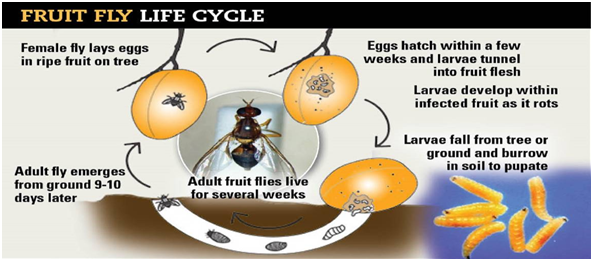Table of Contents
What To Know About Fruit Flies?
Do Fruitflies Bite?
Everyone is very much familiar with fruit flies. Since Fruit flies are commonly seen indoors, in homes, eateries, superstores and wherever food becomes rancid and fermented. Because of the widespread phenomenon of these species people usually end up asking if these fruit flies bite.
Well, the answer is No they definitely do not bite even despite the fact that they carry bacteria along wherever they land.
Just because they belong to the category of bugs and insects doesn’t mean they are actually going to bite like hundreds of other species.
Fruit flies are also commonly referred to as Drosophila melanogaster or vinegar flies as they are attracted towards the rotten smell of vinegar says the research.
Given that fruit or vinegar flies have a preference for fermenting food constituents in mops water or even on wet mops, these flies doesn’t need blood for their survival as they don’t have biting mouth or any stinging mechanisms that can harm human skin on contact.
However there are a lot of other damage that they can do with our digestive systems. Have a look on what Expert Janice Crenet says about fruit flies
“Fruit flies do not bite because, instead of teeth, they have proboscis injectors that help them eat over-ripe fruit more efficiently.”
Biological behavior and characteristics
According to Animal Diversity Web (ADW) the fully grown fruit fly is usually a yellow brown (tan) color, and is about 3 mm in length and 2 mm in width only (Manning 1999, Patterson, et al 1943). Also, the shape of the common fruit fly’s body is what one would normally imagine for a species of the order Diptera.
Just like other species of flies it has a round head with big, red, composite eyes; along with three smaller eyes, and a tiny antenna. Its mouth serves like a sucking straw developed for sopping up liquids from the food (Patterson and Stone 1952).
Male and female fruit fly
Research indicates that The male is slightly shorter than the female fruit fly.There are black stripes on the upper surface of its abdomen, which can help to identify the gender. Also Males have a more black pigmentation concentrated at the lower end of the abdomen (Patterson and Stone 1952)
Life Cycle
Fruit flies have a short lifetime, two days after mating there comes the next larvae tunnel stage and their usual existence hardly ever exceeding 10 days as an adult is seen. Fruit flies always lay their eggs near fermenting, soggy and organic food surfaces. Upon emerging, the tiny larvae keep on feeding from near surfaces of the fermenting items available.
This surface-feeding characteristic of the larvae is considerable in that spoiled or over-ripened pieces of fruits and vegetables can be cut away without having a need to throw away the rest because of the fear of retaining any developing larvae.

Reproductive cycle
The reproductive perspective of fruit flies is colossal; given the chance, they will lay about 500 eggs. The complete journey from an egg of a fruit fly to a fully grown can be completed in just about a week.
Where do they live?
Fruit flies are particularly attracted to ripened vegetables and all kind of fruits in the kitchen and citrus ones are their favorite. However, there are other places where they have huge infestations. All they need is some damp environment and fermented materials to breed.
For example they can breed in sewerages and drains, garbage cans, food leftovers, wet mops or mats. However, sometimes Infestations can instigate from over-ripened fruits or vegetables that were already affected from infestation and brought into the house.
Why they can harm humans?
As discussed earlier they cannot bite humans but they certainly are harmful. Only the the question is how?
Fruit flies don’t have any teeth , but they keep buzzing on food items. They have the ability to infect the food with harmful bacteria and other mal disease-producing microorganisms. As they feed on putrid stuff, so their presence is a carrier of all the bacteria spilling over and around a ripening fruit. This is where humans can find themselves in danger with fruit flies.
A scientific research in Applied and Environmental Microbiology Jul 2005 indicates that while the risk is small, some fruit flies have been verified to be carriers of pathogenic bacteria, which have the potential to spread to humans via contact directly.
Also not only do these pests makes the surface shine of fruits with bacteria when they come in contact, but females also lay their eggs into the material, which can certainly lead to human ingestion.
Prevention
The only best way to avoid these little annoying flies is to eradicate all the sources that attract them. Try to use fresh fruits and vegetables. Splintered or spoiled parts of fruits and vegetables should be cut away and discarded because of the presence of eggs or larvae in the ripened parts.
A single putrid tomato or apple forgotten in the grocery closet, or fruit juice jar under a refrigerator can be s breeding vessel for thousands of fruit flies. Also so can a dustbin stored in the basement which is never clear or cleaned.
People who own fruits and vegetables should make sure that the containers are sealed tightly; otherwise, fruit flies will lay their eggs under the lid and the tiny larvae will enter the container upon hatching. Windows and doors should be prepared with tight-fitting screens in order to restrain adult fruit flies from entering inside from outdoors.
How do you get rid of them?
Getting rid of these tiny little pests is not a very hard thing to do. You can either try the following techniques or buy yourself a spray or flies catching machine.
Vinegar trap
Fruit flies can be got rid of by making a vinegar trap. Simply by pouring some vinegar mixed with water in a jar and placing a small pierced lid that will allow them to enter the trap. You can also do this by pouring about an inch of apple cider vinegar into a bowl or cup.
Then you pop a plastic bag over it and tighten it around the vessel with a rubber band. After that cut off one of the corners to for creating small holes. Then leave the trap near the infestation for some time. The flies will be engrossed to vinegar causing them to fall in and sink.
Fruit Fly Drain Treatment
This drain treatment product is what you need if you feel like the source of the fruit flies are the drains in the kitchen and bathroom.
The active ingredient of this gel is citronella, a natural bug repellent. Simply just apply on some defective fruit and this will make it easier to make them eat and thus dying.
Use a Sticky Fly Trap
Sticky fly traps, such as the yellow sticky trap, works really well for people who are dealing with severe fruit fly infestations. You can place numerous traps in and out of your kitchen and bathroom and living rooms.
There’s no way for the flies to get away once they sit on the sticky surface. These traps also aid in reducing other widespread pests like gnats, pantry and clothes moths, and white fly in houses etc.
Using Cedar Wood
Another unique and natural solution easy remedy for catching, fruit flies. Cedar wood is a natural repellent for these flies. Keep them near your drains, around kitchen or places where they can find food.
Essential oils are really essential!
You might have heard that essential oils are a handy first aid kit. Same is the case with fruit flies. These little creatures are not very friendly with this oil.
It acts as a natural repellent for flies and bugs. Add 10-15 drops of some certain essential oils like lemongrass oil or lavender oil and mix in 2-4 ounces of water.
Spray all the corners, drains, and kitchen and near fruit baskets on tables. This mixture is repulsive for bugs and Fruit flies, plus it will add fresh aroma in your home.
Blow them away!
Yes, but not literally blow them away! If you are looking for a quick remedy then Just turn on some blow dryer and turn them away from the fan. The suction on the opposite side will suck the fruit flies and they will be burnt with the heat inside. It’s cruel though but surely you will get rid of them temporarily right away.
Having said that, you can try any of the following sprays and pest controls from Amazon.com and get rid of these flies once and for all. But make double sure that they are safe to use and do not cause any safety or health hazards.
Although these tiny pests are filthy for sure, but certainly they are not going to bite You or can cause direct injury. So if you experience a bite from any fly just be sure that is not from a fruit fly!
